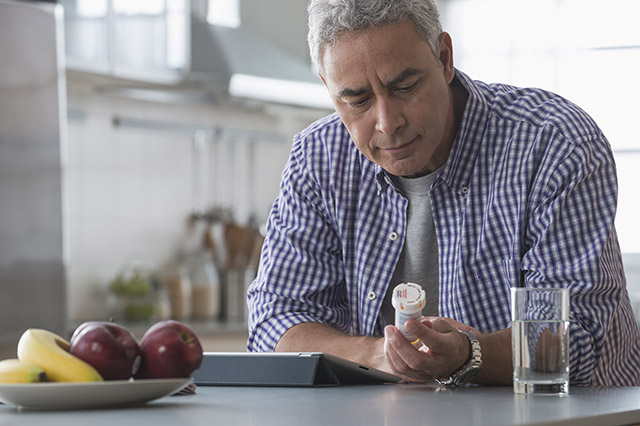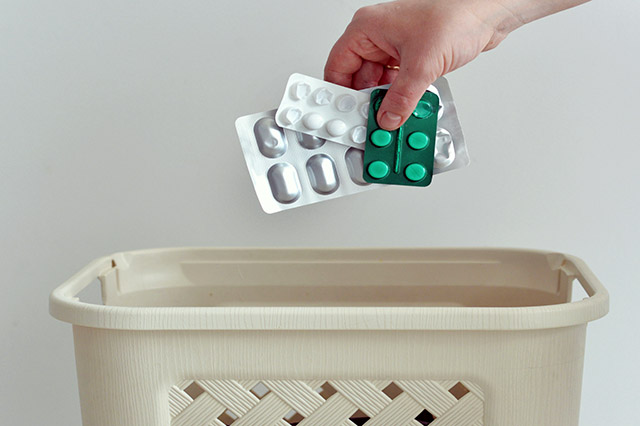It may be tempting to hold on to unfinished prescriptions with the intention of using in case of an emergency, but starting a collection in your medicine cabinet can be dangerous in a number of ways.
You wouldn’t eat food well past its expiration date. The same principle should apply to your medications. Not only can drugs lose their potency or have different effects than originally intended when past their prime, but expired drops, sprays or other liquid medicines can grow bacteria. Furthermore – and most important to consider – some medications can be harmful or deadly if they end up in the wrong hands.
According to the U.S. Food and Drug Administration, approximately 60,000 emergency department visits and 450,000 calls to poison centers are made after children under 6 years of age find and ingest medication without caregiver oversight.
To protect children, pets and others from accidental or illegal consumption, not to mention helping the environment, use this guide to learn how to get rid of expired medications the correct way.
Don’t Flush or Toss
Review all of your prescriptions and note the ones that have passed their expiration dates. Once identified, first look into drug take-back sites or redistribution sites near you.
If bringing your prescriptions to a take-back site is not possible, then check to see if they are one of the 14 FDA-approved drugs that can be flushed. These drugs can be flushed due to their potential to be fatal if accidentally consumed or misused by children, pets, or other individuals who are not prescribed the medication.
Check the documentation that was provided with your medication; it may tell you how to properly dispose of that particular drug. Otherwise, follow these steps to dispose of drugs you cannot flush or bring to a return or redistribution site.
- Do not hold onto outdated or leftover medications. Take a regular inventory of your medications, check their expiration dates and make sure medicines that are still good are being stored properly. Do you have leftover medications because you forgot to take them? These reminder tips could help.
- Do not take apart capsules or crush pills or tablets. Instead, remove them from their original packaging and mix them whole with an unappealing substance. Examples include cat litter, used coffee grounds, dirt/soil or sawdust. The point is to make sure animals or people won’t be tempted to eat or take the medication. Then, put the mix in a sealable can, container or plastic bag and throw it away.
- Packaging for prescriptions often has your personal data (your name, address, phone number, the order number, etc.) so be sure to remove, cross out or scratch off any labels. Then, simply recycle or throw away the bottles, boxes or other packaging.
- Flushing medications should be a last resort for disposing of medications. According to the Environmental Protection Agency, traces of medications can leach out of septic tanks into the groundwater, as well as from wastewater treatment plants, which are not equipped to filter out drugs. The FDA is “aware of reports of very low, but measurable levels of medicines in surface waters such as rivers and streams, and to a lesser extent in drinking water.”

Take-Back Sites
If your medications didn’t come with specific disposal instructions, leftover medications can be brought to drug take-back sites, as well any U.S. Drug Enforcement Administration-authorized collectors. To find a permanent collection location near you, simply search keywords such as “drug disposal near me” or “medication disposal near me.”
You can also participate in the National Prescription Drug Take Back Day, commonly held in October and April, or ask your pharmacy about possible mail-back programs.
Donate or Recycle
Medications are expensive. Rather than letting them go to waste, drugs that have not expired could be recycled or donated to help someone in need.
Since the fall of 2018, 38 states have passed laws establishing drug redistribution programs, where “participating pharmacies, charitable clinics and/or hospitals collect and redistribute donated drugs to eligible patients,” according to the National Conference of State Legislatures.
New Hampshire is currently the only state in the Northeast with an operational program. While Connecticut, New Jersey and New York had enacted laws in the past, the programs are not operational at this time. To get your state’s drug redistribution program running again, contact your local government officials and voice your concerns.
3 Thoughts on “How to Properly Dispose of Expired Medications”
Leave A Comment
Comments are subject to moderation and may or may not be published at the editor’s discretion. Only comments that are relevant to the article and add value to the Your AAA community will be considered. Comments may be edited for clarity and length.














The Police Department in my town (Littleton, MA) has a locked drop box to dispose of medications. I would suggest that people check their town Police Department to see if they have similar locked drop boxes.
That’s a great suggestion.
Thanks for reading and commenting!
This is too complicated. All pharmacies should be required to take back all unused medications.